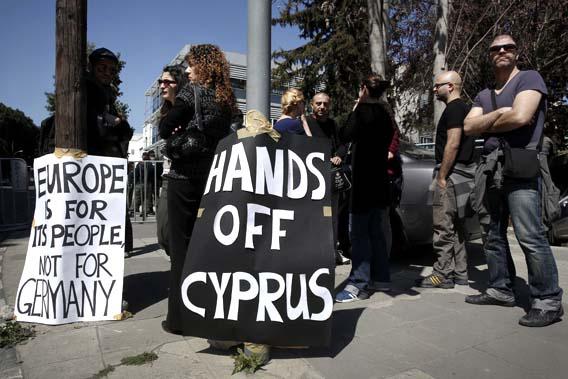Ever since the spectacular collapse of Lehman Brothers in 2008 and the ensuing financial crisis, regulators and politicians have lived by a single rule: No losses for bank creditors. The common thread of every bailout has been that banks pay off their debts in full.
That principle collapsed this weekend in Cyprus, as Germany and a handful of other financially healthy European nations finally said enough.
Cyprus itself is an exceptionally small country. Its government controls about 60 percent of the land mass (the rest is an ethnically Turkish breakaway section) of an island located closer to Beirut than Athens (to say nothing of Paris or Frankfurt). Its total population is 1.1 million—less than the city of Dallas—and subtracting the 300,000 or so Turks beyond its actual control, it’s closer in size to Fort Worth or Columbus, Ohio. And yet relative to the size of its economy, Cyprus has an enormous banking sector swelled with the deposits of wealthy foreigners, mostly Russians. Is it wrong to assume that Russian millionaires seeking offshore banking havens have something to hide? Perhaps it’s nothing more nefarious than tax evasion, but more lurid possibilities come to mind.
So when the banks of Cyprus started to fail, dragged down by huge, disastrous investments in Greece, the countries called upon to rescue those banks were understandably not excited about the prospect of handing billions of euros over to facilitate Russian money-laundering schemes. Bailout-fatigued German, Finnish, Slovakian, and Dutch voters demanded that creditors hand over a pound of flesh to reduce the overall cost.
“Bank creditors,” as it happens, is a class of people that includes bank depositors. Everything about the rhetoric of banking is designed to obscure this. You deposit money in your bank account and you can go online 24 hours a day and check how much money is in there. But what you’ve really done is loaned the money to the bank, and the bank has promised that it’ll repay your loan. If the bank takes the money it’s been lent and squanders it on bad investments, then you’re going to be in need of a bailout if you want to get your money back. When the FDIC guarantees your bank deposit, it is essentially saying it will bail you out if your bank fails.
The Germans and their allies insisted that in exchange for substantial financial assistance, Cyprus was going to have to make its bank depositors take a “haircut” on what they’re owed–get less than 100 percent of their money back, in other words. Legally, this is being organized as a special one-time tax on bank deposits. The initial plan was to levy a 6.75 percent tax on deposits under 100,000 euros and a 9.9 percent tax on deposits over 100,000 euros.
This seems in some ways like an unfair solution for all the small depositors. The fact that the Cypriot government had formally insured the deposits of EU citizens up to 100,000 euros makes the taxation of small depositors all the more baffling. Why not exempt all deposits up to the 100,000-euros line and make it up with higher taxes on uninsured large deposits ? Why tax a Nicosia waiter who’s saved up a few thousand euros to buy a car if the problem is rich Russians? Officially, President Nicos Anastasiades’ stance is that a punitively high tax on big deposits would be bad for the Cypriot economy because it would imperil its status as an offshore banking sector. But realistically, whether you confiscate 9.9 percent of large deposits or 19.9 percent, your days as a safe haven are numbered. The real rationale probably has more to do with defending the interests of rich Cypriots than any hope of saving Cyprus as a financial sector.
After an initial wave of political backlash, the terms are now being reconsidered and rightly so. It’s perhaps not possible to entirely spare middle-class savers, but they can be cut a much better deal than this.
This admittedly important detail aside, the new principle of imposing bank losses on creditors, including depositors, seems sound and worthy. For years, Europe has been paralyzed by the fear that any losses to any bank creditors anywhere would lead to continent-wide meltdown. Bank runs are socially and economically costly, but excessive complacency about the safety of loans made to financial institutions can be as well. Banks rely far too much on debt to finance their investments, making them far too fragile and prone to failure. Regulators should tighten the screws and make banks recycle their profits into debt reduction rather than paying dividends to shareholders. Improved versions of Cyprus-style haircuts will also make banks behave more responsibly. A modest amount of deposit insurance is a socially useful way to let regular people have secure bank accounts without becoming experts in bank supervision. But the willy-nilly extension of the principle—insuring all depositors up to any amount—leaves banks overindebted and underdisciplined.
The fact that the plan has merit makes it all the more important to do it sensibly. Thus far, a well-organized haircut plan—in contrast to the chaotic Lehman bankruptcy—does not seem to be provoking any dangerous financial contagion around the world. But if similar plans are to be workable in countries less weak and tiny than Cyprus, they have to be done in way that are less punitive to small depositors and put the risk where it belongs—on wealthier, presumably more sophisticated, investors who have the capacity to assess the soundness of different banks. As problematic as the initial Cyprus proposal was, it is an important step back to post-crisis normalcy.
